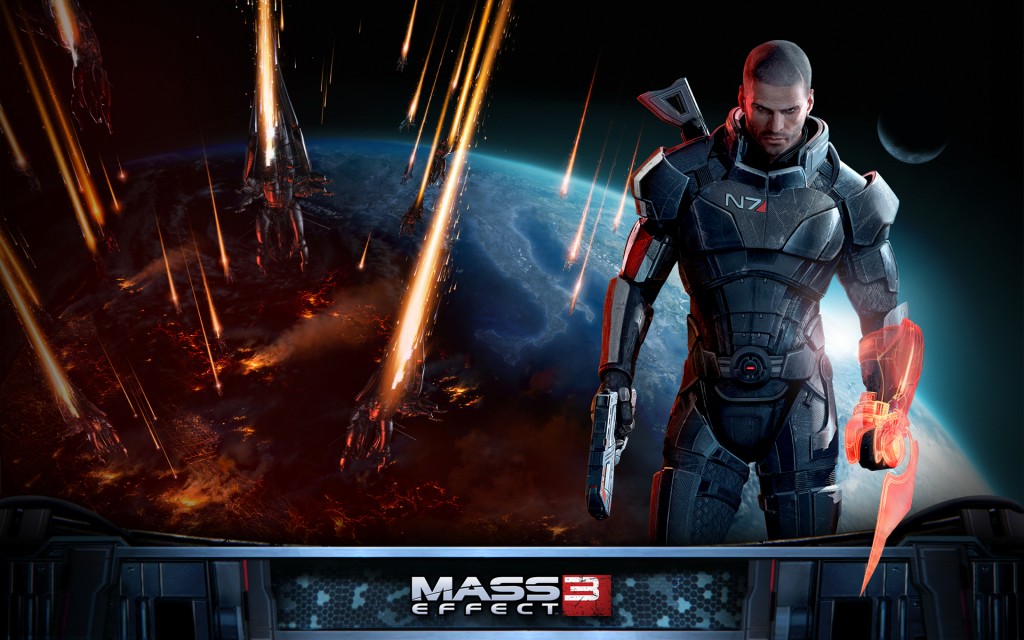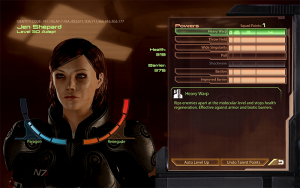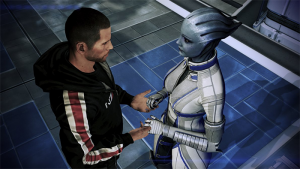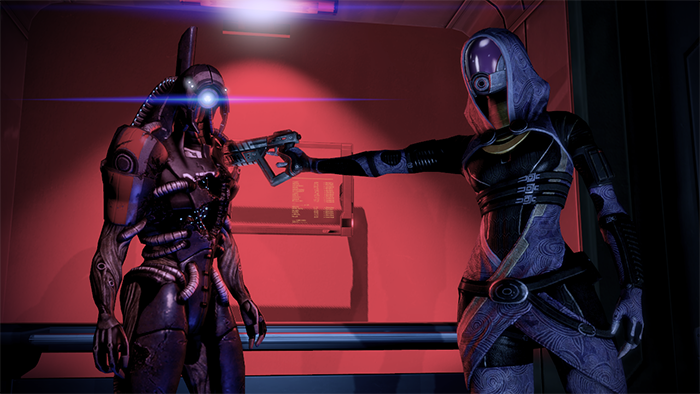As was promised in the first post, we’ll be kicking off our choice-laden journey with a great leap by venturing into space with the Mass Effect trilogy developed by BioWare. The games are set towards the end of the twenty-second century, across a multitude of planets including Earth, and follow the story of Commander Shepard, the first human to serve as a member of an intergalactic special task force, the Spectres.
The series has been generally praised for its involvement of the player in shaping the universe, with a notable exception being Mass Effect 3’s ending, the conclusion of Shepard’s saga, which caused great uproar among fans and critics, and has been criticized for robbing the player of agency, or rendering all previous decisions insignificant and inconsequential. As the issue of the ending is such a polarizing and complex one, I will dedicate the next post to it.
I would delineate three categories of choices in the games based on their scopes: the smallest category I would designate as “the personal” (what kind of person are you?), a larger one as “the interpersonal” (will you help a stranger? will you fall in love with one of your companions? will you let others die?), and the largest as “the galaxy-wide” (will you save or annihilate entire alien races? will you save the galaxy?). Although my initial proposal of separate categories may imply completely isolated divisions, I’d like to emphasize that in practice they are all intertwined, that is, galaxy-wide decisions may hinge on interpersonal ones and vice versa, and both are shaped by and in turn shape the personal.
Personal choices are implemented at the very start of the first game, while the player creates their own Shepard. Aside from the regular build-your-own-hero mechanic found in many role-playing games, in Mass Effect the player builds their own Shepard’s past: their pre-service history (origin), and their psychological profile (pre-game reputation). Shepard can thus have nine different backgrounds that set up how the player relates to their character. While an interesting narrative device, Shepard’s background is largely ignored by the game. Only a couple of dialogue lines reference it in passing, and out of the many possible assignments Shepard can take on, there is a single mission that is influenced by the various background options, and even then, only in a minor way.
Another interesting mechanic of the game is the Paragon/Renegade reputation system, which is informed by choices made in all three categories, but at its core describes what kind of person Shepard is. Based on the player’s dialogue and story choices, Shepard may gain “paragon points” for acting compassionately, or “renegade points” for being more apathetic or ruthless. The points do not negate each other, but instead feed into separate meters whose levels determine how other characters see Shepard and unlock special dialogue and story options. This of course means that the game provides clear and immediate feedback on the player’s actions, and that certain choices have some kind of morality assigned to them. The effect this has on the player’s experience is debatable. On the one hand, the reputation system makes perfect sense in-universe, and relatively easily unlockable content makes the player feel not only more involved, but also grants a sense of achievement. On the other hand, some immersion may be lost due to players trying to anticipate the morality assigned to certain choices and “gaming the system” solely to achieve full paragon or renegade status instead of truly role-playing Shepard.
On the other end of the spectrum are the decisions, that, based on the player’s choice and past choices, shape the entire galaxy. Though the connection between past choices and present interactions isn’t always immediately clear. These decisions usually involve such weighty issues as the saving of planets and alien species, sometimes at the cost of the destruction of another. Depending on who Shepard wanted and managed to save, by the end of the trilogy the Commander can unite almost the entire galaxy. While these scenes are done well and carry an appropriate gravitas, they don’t seem to have much tangible effect on Shepard’s story: some dialogue will remind the player of their choices, but ultimately, the main storyline remains the same, and even if one ally is lost, another who is almost identical in their function may be recruited. The diminished impact of such important decisions made some players feel that the game merely presented the illusion of choice. Another criticism leveled against these choices is that the consequences of smaller past decisions aren’t always foreseeable. But do these factors really make the choices any less meaningful? I would argue that they do not: Shepard and the player will still experience the relief and the satisfaction, or the pain and the grief these choices bring, and will still feel the desperation and the weight of their burden. As for the unpredictability of some outcomes, well, isn’t that just art imitating life?
But what truly defines the games and makes them feel like the player’s own, are interpersonal choices. Throughout the games, Shepard can recruit companions with whom the Commander may form meaningful relationships. Getting to know these characters through dialogue and seeing their reactions to Shepard’s actions, bonding with them by doing their personal quests, and seeing them form connections between themselves makes the experience truly personal. Urging squad mates to do the right thing or letting them indulge in something that conflicts with Shepard’s or the player’s own moral code presents interesting, and often hard to resolve dilemmas to the player. Gaining crewmembers’ loyalty and affection might influence end-game outcomes and have larger-scale consequences: for example, having someone accompany you on certain missions can provide additional options, much like in real life.
I would argue that while a galactic threat looms large on the horizon through all three games, it is the smaller, personal and interpersonal choices that make the games what they are: an engaging, personal, and epic (and I mean that in the classical sense!) tale of one person’s struggle to do good and make the most of a terrible situation, to be a savior, not necessarily because they want to but because they have to, or to stick to their ideals even when that might be unpragmatic, or even to simply do the job that’s in front of them.
Sources of images: BioWare, thanemod.wordpress.com, deviantart, deviantart, moddb.com









thank you, lovable to read
thank you for sharing